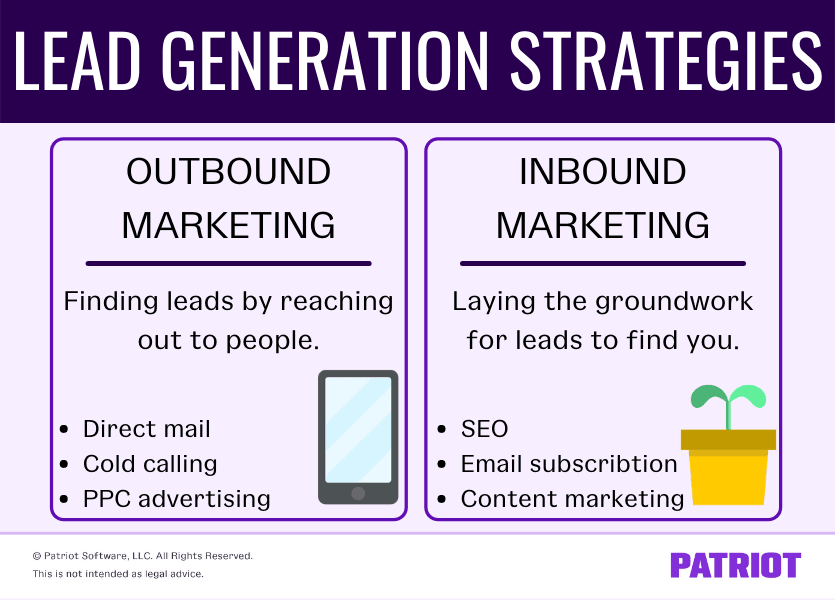Your ability to generate sales leads in ever-increasing quantity and quality is one of the most important factors in determining how quickly your business grows. This article reviews everything you need to know about lead generation to implement the right strategy, evaluate lead generation campaign options, and properly execute the options you select.
What is a lead?
A lead is a person or business that would be a good customer. A lead could be a person or business:
- You’ve contacted
- That has contacted you
- That simply fits your customer profile
Before you start putting together your lead generation marketing strategy, define what your ideal customers look like. Lead quality and quantity are the objectives.
If your efforts bring in a lot of poor leads, you will waste valuable time trying to close sales that are hopeless, or even worse, end up with customers that buy the wrong things in the wrong quantities for the wrong reasons.
Lead generation strategies
Finding leads by reaching out to people is an outbound marketing strategy. The two ways to conduct an outbound campaign are:
- You initiate one-to-one communication. Tactical campaigns in this category include email marketing, direct mail, referral programs, event marketing, and cold calling.
- You broadcast mass messages. Tactical campaigns in this category include PPC (pay-per-click) advertising, print advertising, TV / radio advertising, and billboards.
Laying the groundwork for leads to find you (i.e., having them initiate contact with you) is an inbound marketing strategy. Examples include:
- Opt-in email campaigns. For instance, displaying an email subscription box on your website.
- Content marketing campaigns. For instance, writing articles on blogs in your industry that attract curious readers to your website.
- SEO (search engine optimization). SEO makes pages of your website rank highly on Google when people are searching for the things you sell.
- Social media marketing. For instance, posting and commenting on social platforms to build a following of potential customers.

Which is better, outbound marketing or inbound marketing?
Outbound marketing is effective because it’s personal. Personal contact (assuming you’re contacting the right people) tends to generate higher close rates. However, because outbound is more personal, it is hard to do on a massive scale without investing in a very large staff.
Outbound marketing works well when customer relationships are complex and important, and / or when the product or service being sold is very expensive or complex. Because these characteristics are common in B2B, one-on-one outbound strategies work best.
Inbound marketing is effective because it casts a wide net. Even though close rates are lower, companies reach so many leads that the number of inbound-generated customers far exceeds what any outbound campaign could produce.
Inbound marketing works well for many consumer products, and for any sort of product or service that is easy to explain and well-understood by your prospects.
Important side note: A big advantage of inbound and mass-outbound marketing for a new company is generating brand awareness. Through SEO, PPC, social media, etc., you introduce your company to tens of thousands of people, perhaps more, within a matter of months. This brand awareness and the credibility it brings will help you close sales in ever-increasing numbers as time goes on.
Subscribe for more great content!
Get the latest small business news delivered straight to your inbox.
Subscribe to Email ListPicking the right lead generation campaign
You may want to try outbound, inbound, or both as you’re starting out. Testing different campaign options is a great idea—if you don’t spread yourself too thin in terms of budget or staffing. A huge mistake many new companies make is investing too little in a campaign that would have succeeded had it been properly funded. The best approach is to run a manageable number of campaigns for six months to a year, and then evaluate.
With so many campaign options, how do you decide which to choose? Unfortunately, no one-size-fits-all solution exists. But here are important things to consider:
- What seems to work in your industry? If everybody in your business is on social media or billboards, maybe that’s because these things work. The key here, however, is to look deeply. Try to find out if your competitors’ lead generation campaigns are generating leads!
- Where can you best reach customers and prospects? Blogging is a great lead generation option—if your prospects read blogs. Same is true for social media, or radio, or any other communication medium. Make sure you are conducting your campaign in a place where you can connect with your audience.
- How much time do you have to generate leads? SEO gets terrific results for many companies but takes months to gain traction. Similarly, events can work wonders but probably can’t be pulled off in a matter of weeks. If you need customers now, options such as an aggressive referral campaign, telemarketing, or PPC advertising can be ramped up quickly and accelerate the prospect’s decision-making.
- Have you asked your customers what works? Always try to understand how your existing customers found you, why they were attracted to you, and how they think you should generate more leads.
Successful lead generation campaign execution
Lead generation campaigns are seldom simple—and perfect—right out of the box. The keys to doing them correctly include:
- Budget adequately
- Make sure you have people with the right skills doing the work, either on-staff or outsourced
- Set clear and reasonable objectives
- Give your campaign enough time to achieve your objectives
- Establish KPIs and collect data that allows you to evaluate performance
- Review data monthly (or more frequently) to assess performance and adjust tactics or strategy
A final thought: Some lead generation campaigns, such as email, can be measured precisely, while others, such as social media marketing, are a bit harder to evaluate. The ability to measure is certainly important, but don’t select or reject a campaign exclusively for that reason.
Consider all the pros and cons carefully, and then move forward with a lead generation strategy you can fully embrace. That approach is the one most likely to succeed.
This is not intended as legal advice; for more information, please click here.
These views are made solely by the author.
